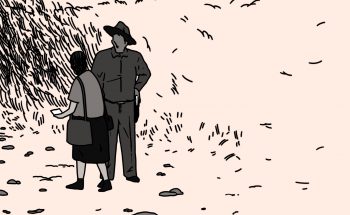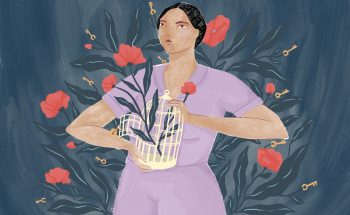
Translation – Postcard from San Salvador
Share:
Translation by Patrick Moseley
[Daniel Alarcón, host]: Welcome to Radio Ambulante from NPR. I’m Daniel Alarcón.
In may of 2015 I traveled to El Salvador for the first time. During that time, according to official numbers, El Salvador was the most violent country in the world. It was common to see headlines like this one from the International Business Times:
“El Salvador to become deadliest peacetime country in the world.”
There was a lot of talk about a state of war, without an official war.
Like in other armed conflicts, there two sides. In this case, the maras –or gangs– and the police. And like in other armed conflicts, the ones who often suffer the most are civilians, people who have nothing to do with the conflict. That’s because excessive violence in El Salvador affects all aspects of daily life. And not always in the way you expect it.
So the question I had was this: if what was going on in El Salvador was not a war, then what was it exactly?
Everyone I talked to had been touched, directly or indirectly, by this chaos and violence. And Salvadorans of all social classes had learned to deal with that constant feeling of insecurity.
And of the people I met, of the testimonies I heard, the one that impacted me the most was Iris’.
For safety reasons, we have decided not to use her last name.
[Iris]: I live in the outskirts of the capital. It’s a semi-rural area, you could say. And the area where I live is like a trifinio.
[Daniel]: And that’s a word I’d never heard before.
[Iris]: A trifinio is a place with three borders. That’s how we use that word here. So the thing is that I live in a place where the area where I live is urban, and around it there are several rural areas that are communities led by two gangs, the main ones here.
[Daniel]: The Mara Salvatrucha 13, and Barrio 18. Two of the most feared gangs in Latin America.
[Iris]: I’m in the middle, so when I go to my house, I go through a railway line every day. That territory is MS. At the end of my neighborhood there’s an area that’s led by the 18 gang.
[Daniel]: That year, 2015, it was estimated that there were around 500 to 600 thousand salvadorans involved in one way or another with the maras. About 10% of the population. That number came from the Secretary of Defense, David Munguía Payés.
Let’s put it this way: almost 10% of the country was dedicated to extortion, criminality, drug trafficking, and violence. Which means that a big part of the population, people who have nothing to do with that, still have to live with that evil. They don’t have a choice, or a way out.
People like Iris.
[Iris]: You always hear that if you don’t mess with anyone, they won’t mess with you. Partly true, partly false.
[Daniel]: Iris, like many salvadorans, lives trying to avoid problems. And in general she’s been able to. She has a good job, she is doing well in her career. The gang members don’t pay too much attention to her, and she has a theory to explain why:
[Iris]: Maybe because in a way I’m out of the gang member’s market. I say that because they like girls who are 17, 15 years old. I’m 25, so I’m not as attractive anymore. Besides, I use glasses, so…and I’m a little bit chubby as well, so they already have a set profile.
[Daniel]: She dresses well, takes care of her appearance. Since she was young there’s been something that she really likes to do: color her hair.
[Iris]: I started with a color that they call chocolate brown. Then I went blond, then platinum blond, then blond with green. Then I went burgundy red, then cherry red, which is even stronger, and then to intense red.
[Daniel]: It’s part of her look, part of her identity. And this story is about that. Because violence, the insecurity brought on by the maras, is not just about what you read in the headlines. A shooting here, a mugging there. No. It’s also about the details. Moments where evil shows up in front of you. Next to you.
Moments like this one.
[Iris]: I was riding a Coaster, a bus, and a girl sat next to me… The girl was a little heavier than I was. She had her eyebrows very thin, and her hair damaged, dyed.
[Daniel]: Blond. Her lips outlined in red.… Leopard-skin tights. According to Iris, this type of clothing, in El Salvador, is a code.
[Iris]: And because of the way she started talking I knew she wasn’t a normal girl, that maybe she was a gang member’s girlfriend.
[Daniel]: Iris made it clear that she doesn’t think of herself as someone prejudiced who judges others according to their appearance. But, she said, once you’ve learned to read these codes, it’s hard to ignore them. So Iris was very alert, tense, even more than usual.
And here’s another detail to consider: buses in El Salvador are dangerous, because gangs have infiltrated transportation. Passengers run the risk of being mugged, robbed. Sometimes the gangs demand money from transportation companies. And if they don’t pay, the maras can kill the drivers. In other cases, the drivers are accomplices of the gang members. It’s a very complicated situation.
So a girl, who looks like a gang member, sits next to Iris. And of course, she starts to worry.
[Iris]: Little by little she started talking to me. And she asked me if I was someone’s jaina.
[Daniel]: What does that mean?
[Iris]: A jaina is a gang member’s girlfriend. And I told her no. Then she asked me where I lived. I didn’t answer. Because one of the ways a gang member tries to tell if you are in a rival gang or not, is by territories, right? So a year ago, I didn’t know that.
[Daniel]: But since Iris started riding a bus every day, to travel for one hour and a half to the capital’s downtown, now she has to understand these codes. And well, if there was any doubt about the identity of the girl next to her…
[Iris]: She showed me a scar she had on her stomach. And she said, ‘‘Look, these are war wounds. This shows people on the streets the courage we have.”
[Daniel]: We. Meaning, the mara. And then, the girl said this:
[Iris]: She said: ‘‘Hey, change your hair. Because if I see you again on this route, or if any of the drivers see you again, we’ll know it’s you. We all know each other here. And since you don’t want to tell me where you’re from, just be careful. And change your hair.’’
I froze.
It was was like…Oh, God, what do I?
At that time, there were rumors that if you went around with red hair you were from this gang; if you were blond, from another.
[Daniel] Something Iris had not considered when she decided to dye her hair. She didn’t respond to the girl. She didn’t ask why, she didn’t try to explain.
She didn’t say anything.
Iris had a newspaper in her hand, and she was looking at it, nervously,
[Iris]: “Give me that newspaper,” she told me. And she took it out and the first thing it said, on the front page: “Police Officer Dead in…” I don’t remember what. And she starts laughing. She says to the driver: ‘‘Hey look,” she said. “How original! They killed another one.’’ And she went on like that. I was so cold, and regretting that I had gotten on that bus.
[Daniel]: She was a girl, from a gang, who wanted to intimidate her.
Iris: “How do you like the eyebrows?” she said. “I like them,” I told her, “they go with your face.” “You should wear yours like this,” she said.
[Daniel]: And then she asked her where she was getting off. “La plaza”, Iris said, although she was going home. She was referring to a mall, full of people. She thought, “I’ll be safer there.” And she added another detail: “I’m going to meet my boyfriend there,” Iris said. “To go to the movies.” But…
[Iris]: I don’t have a boyfriend.
[Daniel]: And the girl said, “I’ll go with you.”
[Iris]: When she told me, “I’m getting off with you,” I lost my breath. I lost my breath.
[Daniel]: Iris put her hand in her purse.
[Iris]: And I dialed my mom’s number. I dialed my mom’s number because I thought, “if she doesn’t let me get off, or something, at least she will hear…at least she will hear what’s going on.”
I felt… stalked. Because the driver was a gang member. I mean, they were talking like equals. So I dialed my mom’s number, and I couldn’t hit send. I couldn’t hit send. Maybe I was too nervous. And she told me, “what are you looking for?” she said. I said, “nothing, I’m just looking for coins,” I told her. “I’m just looking for coins.” And she says, “OK, so we get off at La Plaza,” she said.
[Daniel]: They were coming down the boulevard. It was very congested. The woman told the driver:
[Iris]: “Hey man, I wonder what happened there,” she told him. “Don’t pretend! remember that we saw that a while ago?” he told her. “Oh yeah,” she told him. “The beheaded guy,” she said.
[Daniel]: That day a gang member had killed a driver from another bus line, from another route. The girl told Iris about it, proudly.
[Iris]: “I don’t know what you’re talking about.” “No, look, look out the window,” she said. “Up ahead over there’s a bus from 113,” she said. “Where they shot a driver,” she said. “I know the guy who shot him,” she told me. “Oh ok,” I said, “yeah, that’s right.” So we drove through the scene, and I looked at the bus, and yeah, the guy was there, under the window –the driver– and below him a big puddle of blood. Red, red, red.
[Daniel]: And then, it started to rain. Pringar, like they say in El Salvador. A light rain.
[Iris]: And I tell you, I love winter. I love rain. I think I’d never been more thankful for rain. Because she tells me, “Shit, look”, she said, “it’s raining.” “Yeah, it’s starting to pringar,” I told her. And she said, “I’m not going to get off with you anymore.”
[Daniel]: They were close to their destination: La Plaza, the mall.
[Iris]: I don’t know how I got my stuff and got out of there without tripping over her or showing her my back, right?
[Daniel]: And the girl had a last message for Iris:
[Iris]: “Take care of yourself, mami,” she told me. “Don’t let anything happen to you. And say hello to your boyfriend for me.’’ And I said, “have a good day.”
[Daniel]: This happened a few months before I met Iris. When I met Iris, she had already dyed her hair black. I asked her if it had been hard for her to make that change.
[Iris:] It hurt. I mean, it hurt. It was hard to go back to seeing myself with black hair. I had wanted to dye my hair for so many years. But, oh well! I mean, it’s an external thing. It’s not even my style. But now, well, I got used to it. It’s like, ok I have to retouch it, I have to do it.
[Daniel]: A small act of self-expression, snuffed out by gangs. And of course, when you compare this with what you read in newspapers, it seems like it’s not that important. But it is. When gangs impose themselves in intranscendental aspects of daily life, it’s a way of telling the people: “Hey, we’re in charge here. Not you. Not the government. Not the police. We are.”
And it’s not the only time that Iris has had to understand this.
I asked her what she thinks about gangs. Iris is an educated woman, easygoing. While she was telling me the story of the gang member in the bus, she even asked permission to repeat the vulgar words that the girl had used. However, this was her answer:
[Iris]: Burn all of them. Now. I mean, as Salvadorans, they’re not my brothers. I was raised under the gospel, under Christianity, and I don’t see them as brothers. I’m never going to see them as brothers. So if they can round them up in one single fire like a holocaust, do it, burn them!
[Daniel]: It’s an argument I heard over and over again. Kill them. Kill their families, their girlfriends, their kids. Kill all of them.
It’s not hard to understand this rage. I heard many other stories, not just Iris’, and I confess that for a moment I also started feeling that anger. But can you really create policies based on rage?
Every time I heard how this solution was proposed, I felt completely discouraged. Leaving ethics aside, collective murder is simply not possible in political or practical terms.
I repeated this argument several times, and later, when I was alone, I would go back to the conversations on the issue and my role in them and get more and more depressed.
Maybe that’s what we have to understand about the situation in El Salvador today. A normal citizen, who is not even bloodthirsty by nature, proposes that the only solution is a genocide. And to dissuade her, we end up talking about why that solution is not practical.
We’ll be right back.
[Ad]: Support for this NPR podcast and the following message come from Sleep Number, offering beds that adjust on each side to your ideal comfort. Their newest beds are so smart, they automatically adjust to keep you both you and your partner sleeping comfortably all night. Find out why nine out of 10 owners recommend. Visit a Sleep Number store near you.
[María Hinojosa, host of Latino USA]: Hey, it’s María Hinojosa, host of NPR’s Latino USA, the podcast that takes you inside the latino conversation. Each week, we will take you into one story that will fascinate and often surprise you. Listen to Latino USA on the NPR One app or wherever you listen to podcast.
[Lulu Miller, editor of Invisibilia]: It’s Lulu Miller and I am back with a new story from Invisibilia. It’s about the pleasures…
[Man]: It’s just electric.
[Lulu]: And the dangers…
[Woman]: There is just nothing more scary…
[Lulu]: Of trying to live between two worlds. You can find Invisibilia on NPR One or wherever you get your podcast.
[Iris]: About 15 days ago, more or less, I had the opportunity to listen to the story again.
[Daniel]: This is Iris. We picked up our conversation not too long ago, this time through Whatsapp.
[Iris]: And well, as I listened to my story, I cried during some parts again because recalling that feeling of being cornered or not seeing your family again is really hard, because you know you lived it, because you know it happened.
[Daniel]: I wanted to know how she was doing, what was new in her life, and how she felt now, after listening to her strong reaction towards mareros, gang members.
[Iris]: When I got to that part I just said: “Wow.” I was so mad. I was full of anger. And I questioned myself.
[Daniel]: She told me she’s not a bad person. That she believes in God. She’s against citizens taking justice into their own hands, something that, according to her, would only generate hate. And the idea of exterminating all of them…
[Iris]: It would not do any good. And I don’t want to come off as if I’m speaking with anger or hate, because the truth is that I’m not. I’m speaking from a lot of pain…because I think that’s the word. That’s the word.
(SOUNDBITE FROM NEWS REPORT)
[President Salvador Sánchez]: Last year we made changes in our security policy…
[Daniel]: This the president, Salvador Sánchez Cerén…
(SOUNDBITE FROM NEWS REPORT)
[President Salvador Sánchez]: Now we can see the positive results and say with certainty that the population is recovering the hope of being able to live in peace and tranquility.
[Daniel]: And yes, since we published this episode in 2015, the homicide rate has decreased…
(SOUNDBITE FROM NEWS REPORT)
[Presidente Salvador Sánchez]: Thanks to the safety measures and everyone’s effort we have reduced homicides by 53% [applause].
[Daniel]: 53%. Sounds very impressive. But it’s not that simple. According to our friends from El Faro, the numbers that Sánchez Cerén quotes hide a more complex reality. Yes, 2016 saw a big reduction in homicide rates. But that was, in part, due to an unprecedented wave of violence that hit the country the previous year.
In other words, if we compare 2016 with 2014, the reduction is not 53% anymore, but rather less than 15%.
But regardless, I wanted to know if the other things the president said was true: that the population is recovering the hope of being able to live in peace.
I asked Iris if she felt safer now, and she told me something I wasn’t expecting.
[Iris]: I’ve been able to color my hair red again. I actually colored it a few months ago, about two months ago.
[Daniel]: And for Isis that shows that things have changed, at least a little bit. Although in these two years nothing has happened to her that has threatened her life, her brothers have not been as lucky. One day, for example, her brother came home beaten, bleeding, because someone had stolen his cellphone. Those are things that happen in El Salvador every day.
[Iris]: The truth is that getting home every night in this country is a daily achievement, it’s a miracle. It’s something you give thanks to your life, God, and anyone you want. So on the street, basically, it just feels like a sense of survival.
[Daniel]: Since the government started taking measures to improve safety, Iris says that she sees more police officers on the streets, in buses. And that can help her feel a little bit safer than before…
[Iris]: But you know that when you cross through certain lines, away from where all that circuit is, no one is looking after you. So in a way you still feel unsafe. You still feel it.
[Daniel]: And more so when there are areas that are still controlled by gang members. Young men who wait in the entrance of a neighborhood to look out for who arrives. Iris says this is a very delicate situation..
[Iris]: It’s something that even though we all know about, no one discusses. And no one talks about it because it’s an open secret. Because it’s something that came into our lives and became normal, so much so that now it’s normal for us to remain silent and not say what’s happening.
[Daniel]: She gave me a recent example. A family member had been beaten by her husband, and the first thing Iris suggested was: let’s call the police. But her family said no, they couldn’t do that.
[Iris]: If you call the police…the boys come.
[Daniel]: Meaning the mareros, the gang members.
[Iris]: And the next day they come see you and tell you to leave the neighborhood, because police officers are not allowed in.
It’s though, because the country you love, the country you learned about since you were small, you start seeing that it doesn’t give you the same freedoms it used to. When you were a kid you would look around and say: “I’m going to go from here to there, I’m going to do this and that.” Now you can’t do that. That’s pretty hard. Believe me. It’s difficult and even though they don’t recognize it officially, it happens. It happens. And although we are scared of talking about what’s going on, it happens…that’s how it is.
[Daniel]: This story was written by me and edited by Camila Segura and Silvia Viñas. Ana Prieto did the fact-checking. The mix and sound design are by Andrés Azpiri.
A huge thanks to Iris for sharing her story with us. An English-language version of this interview was published in The New York Times Magazine. We have a link to it on our website.
I was in El Salvador with Luis Trelles, a producer at Radio Ambulante, who helped me process a lot of what we saw and heard during those days.
Thanks also to our great friends from El Faro, an excellent digital newspaper from El Salvador. And special thanks to Sergio Arauz, Oscar Luna, Jose Luis Sanz, Oscar Martinez, and Karla del Carballo. Hugs for Malu Nochez, who advised us on this story.
Apart from those I’ve already mentioned, the Radio Ambulante includes Jorge Caraballo, Patrick Moseley, Laura Pérez, Ana Prieto, Barbara Sawhill, Luis Trelles, David Trujillo, Elsa Liliana Ulloa, and Luis Fernando Vargas. Carolina Guerrero is the CEO.
Radio Ambulante is produced and mixed on Hindenburg PRO.
Learn more about Radio Ambulante and this episode on our website: radioambulante.org.
And join our Club de Podcasts, a private Facebook group where we talk about that week’s episode with other listeners and members of our team. Search for us under: Club de Podcast Radio Ambulante.
Another way to communicate with us is through our Whatsapp list. Send a message to the number +57 322 9502192 and you’ll be in. I repeat: +57 322 9502192. Jorge assures me that there’s no spam, but we will keep up up to date with new episodes and you can record voice messages with comments, criticism, questions, complaints and greeting for the whole team.
Radio Ambulante tells the stories of Latin America. I’m Daniel Alarcón. Thanks for listening.





